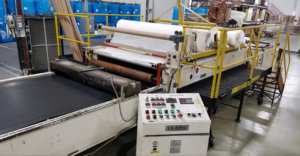Why You’ll Need A Roll to Roll Processing Company

What is Roll to Roll Processing?
This process is integral to manufacturing, and in part it’s dependent on the materials that you use for processing. In fact, this procedure depends on a “roll” of material, typically made of flexible glass or plastic, or otherwise metal foil. It’s a means of fabrication, and it’s meant to embed, laminate, coat, or print applications onto some sort of substrate material.
How It Works?
Usually, roll to roll processing uses several different rollers, which you may hear referred to as the “web path”. This is one reason why you may hear some call this method “web processing”. The substrate material, no matter what it ultimately is, winds continuously through the rollers. Ultimately, we can implement several different operations during production, depending on the specific order made and the product required. Additionally, we apply materials—be they additive or subtractive—to the substrate as it moves through the rolls.
While there are slight variations on this process depending on the material used, at the end of the day they aren’t major. The process is always dependent on that continuous movement, and the substrate is typically thin, flexible, and capable of being transported in rolls. After the applied material has been imprinted on the substrate, the material is re-reeled. This results in what we call an “output roll”.
Which Industries Utilize Roll Processing?
A number of different industries rely upon roll to roll processing, otherwise referred to as web handling or roll fabrication at points. They include:
- IT. In fact, we fabricate many electronic devices in part through roll to roll processing.
- Computing.
- Textile.
- Medical device.
- Metal fabrication.
- Biosciences.
Why? Because quite often, those in such industries require flexible materials. For example, in the solar industry, solar panels require a thin, flexible coating. Many industries need thin-film batteries, which fuel cell membranes. Quite clearly, it’s important for those in these industries to secure the products they need—which presents an opportunity for small businesses, as well as the manufacturers that service them. Rarely, will a business have its own internal roll to roll processing company. Instead, they’ll work with a third party manufacturer.
What Are the Challenges?
Of course, it’s not always an easy undertaking—otherwise, there might not be as great a need for assistance from third party manufacturers. This process is dependent on the web tension control of the machines and materials involved. If the tension control is not consistent, the resulting products won’t be either. If the tension becomes destabilized, the resulting product could in turn be unusable.
The problem is that the substrate utilized in these processes is sometimes altered during its initial loading. If you don’t maintain constant tension and consistency, you may deal with cracks, wrinkles, short circuiting, or de-lamination in the final product.
Should I Utilize A Third Party Roll to Roll Processing Company?
Now, is it possible for every small business to handle this process in house? That’s another question entirely. Roll-to-roll manufacturing is a complex process, and it’s not necessarily easy for businesses small or large to handle it in house. The reasons why business owners find themselves eager to work with a third party are varied. They include:
- Cost Efficiency. It’s often challenging to manage production efficiently in house without spending too much money. This is because manufacturing in house requires purchasing the equipment necessary, as well as the facilities. Furthermore, you must acquire permanent employees in the process—or, alternately, train existing employees.
- Quality Control. The reality is that if your business is unfamiliar to the function of roll to roll processing, there is a higher risk of quality control issues. As previously mentioned, it’s quite easy for roll to roll processing products to have flaws due to minor issues during manufacturing. Ultimately, these flaws result in an entire product run that’s less than it could be.
- Speed. Again, roll to roll processing is an involved process. What this means is that a high quality final product can take some time to deliver. When working with an experienced third party manufacturer, however, you don’t have to worry about this. A third party manufacturer ensures that you don’t miss any deadlines.
Are Third Party Manufacturers Convenient to Work With?
There are many misconceptions about working with a third party roll to roll processing company. Some believe that they must work with companies located out of the country. However, some, like CTI, are within the U.S. and can work with clients across the nation. You can consult with us directly, detailing what you need out of a third party and being as involved in the process as you wish. Depending on the type of third party manufacturing method you choose, you may provide raw materials for manufacturing, and you can have products as customized as is necessary.
Consider getting started by contacting CTI directly—call us at 419-924-5566, or get in touch directly here. Let’s discuss how best to handle your business’s roll to roll processing needs.
- << < Previous Post
- 1
- 2
- ...
- 61
- ...
- 250
- 251 Next Post > >>

